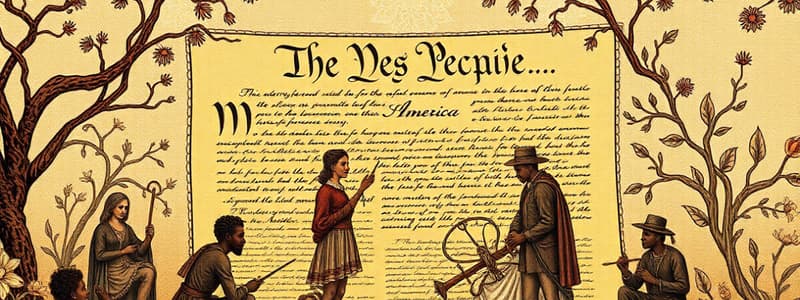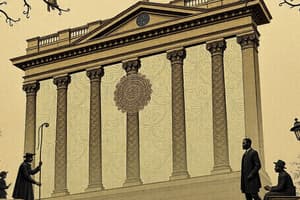Podcast
Questions and Answers
The Constitution did not abolish ______.
The Constitution did not abolish ______.
slavery
The ⅗ Compromise defined enslaved people as ______ of a human for population counting.
The ⅗ Compromise defined enslaved people as ______ of a human for population counting.
3/5
The Slave Trade Clause prevented Congress from banning the importation of enslaved individuals until ______.
The Slave Trade Clause prevented Congress from banning the importation of enslaved individuals until ______.
1808
The founding fathers created a nation known for progress yet built upon a foundation of ______ and inequality.
The founding fathers created a nation known for progress yet built upon a foundation of ______ and inequality.
Many Founders knew slavery was wrong but chose to ______ it.
Many Founders knew slavery was wrong but chose to ______ it.
The Constitution as the foundation of U.S. legal system ______ slavery.
The Constitution as the foundation of U.S. legal system ______ slavery.
Some historians argue that without the ⅗ Compromise, ______ Jefferson would not have won the election of 1800.
Some historians argue that without the ⅗ Compromise, ______ Jefferson would not have won the election of 1800.
The clause facilitated the ______ benefits of slavery for both Northern and Southern states.
The clause facilitated the ______ benefits of slavery for both Northern and Southern states.
The Three-Fifths Compromise and the Slave Trade Clause were significant compromises that secured the ______ of slavery.
The Three-Fifths Compromise and the Slave Trade Clause were significant compromises that secured the ______ of slavery.
American history is a complex tapestry, with both positive and negative aspects, all ______.
American history is a complex tapestry, with both positive and negative aspects, all ______.
Flashcards
Constitution and Slavery
Constitution and Slavery
Despite being seen as a document promoting freedom, the Constitution did not abolish slavery. Many Founders recognized slavery as morally wrong but chose to preserve it for the sake of national unity, leaving a lasting legacy of compromise and tension.
⅗ Compromise
⅗ Compromise
The ⅗ Compromise, a negotiated agreement, counted enslaved people as 3/5 of a human for population purposes, giving Southern states with large enslaved populations more political power in the House of Representatives. This decision reflected the view of enslaved people as less than human.
Slave Trade Clause
Slave Trade Clause
The Slave Trade Clause, found in the Constitution, prohibited Congress from banning the importation of enslaved individuals until 1808, allowing the transatlantic slave trade to continue for almost two decades. This clause was a compromise between Northern and Southern states, reflecting their conflicting economic interests.
Legacy of Slavery
Legacy of Slavery
Signup and view all the flashcards
Holding Complicated Truths
Holding Complicated Truths
Signup and view all the flashcards
Study Notes
The Constitution and Slavery
- The Constitution, while seen as a document of freedom, did not abolish slavery.
- Many Founders knew slavery was wrong but chose to preserve it for economic and political reasons.
- The word "slave" is not mentioned in the Constitution, reflecting a desire to avoid direct confrontation with the issue and maintain national unity.
- The Constitution, as the foundation of the U.S. legal system, enshrined slavery by not explicitly prohibiting it.
The Three-Fifths Compromise
- The ⅗ Compromise, a negotiated agreement, defined enslaved people as 3/5 of a human for the purposes of population counting.
- This decision gave Southern states, with larger enslaved populations, more political representation in the House of Representatives.
- The compromise reflected the dehumanizing view of enslaved people held by many at the time.
- Some historians argue that without the ⅗ Compromise, Thomas Jefferson would not have won the election of 1800.
The Slave Trade Clause
- The Slave Trade Clause, found in Article 1, Section 9, Clause 1 of the Constitution, addressed slavery as a policy issue.
- It prevented Congress from banning the importation of enslaved individuals until 1808, allowing the continuation of the transatlantic slave trade.
- This clause was a compromise between Northern and Southern states, aiming to balance economic interests related to the slave trade.
- The clause facilitated the economic benefits of slavery for both Northern and Southern states, particularly for those involved in the slave trade.
The Legacy of Slavery
- The Three-Fifths Compromise and the Slave Trade Clause were significant compromises that secured the survival of slavery in the United States for many years.
- The United States took over 75 years, a civil war, and the loss of hundreds of thousands of lives, to end slavery.
Holding Complicated Truths
- The founding fathers created a nation known for progress and opportunity, yet this was built upon a foundation of slavery and inequality.
- It is important to acknowledge both the positive outcomes and the negative consequences of the decisions made by the founders, understanding the complexity of American history.
- American history is a complex tapestry, with both positive and negative aspects, all intertwined.
Studying That Suits You
Use AI to generate personalized quizzes and flashcards to suit your learning preferences.




